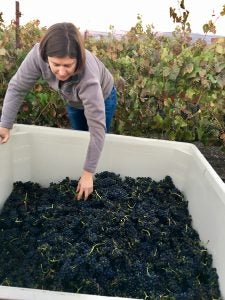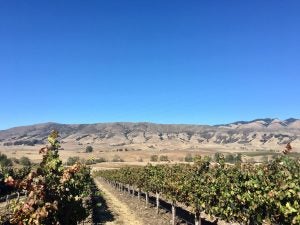
I’m spending time on this year’s National Ag Day thinking back gratefully to a recent meeting I had with farmers.
I was attending the annual farm exchange program offered through the California Agricultural Leadership Foundation, which facilitates learning opportunities on California farms. This year’s program brought together state environmental policy professionals and growers from the Central Coast, an epicenter for growing the nation’s specialty crops, such as lettuce, broccoli, and strawberries. My aim was “to see sustainability through the eyes of farmers.” We toured various agricultural operations, had thoughtful discussions, and stayed with host families in the local farm community.
My host was Erin Amaral, who manages 1,170 acres of vineyards near San Luis Obispo. Erin and I got along immediately – and our conversations kept coming back to one central tenet: farmers and environmentalists want the same things.
[Tweet “Farmers and environmentalists want the same thing, via @rebeccalhaynes @GrowingReturns.https://edf.org/7nr”]
Shared interests
Erin told me about growing up on her father’s Central Valley almond orchard and how she developed an interest in sustainable farming during college. I too became interested in agriculture’s potential to protect the environment during college. We both carried that interest over into our careers – and during my stay, we shared a profound appreciation for the beauty of the vineyard landscape.
Erin strives to make her vineyard as sustainable as possible. A specialist in pest control, she and her colleagues at Pacific Vineyard pioneered a sustainable way to lower the population of mealybugs, a particularly noxious pest that transmits plant viruses, in their vineyards. Over time, this innovative solution allowed them to completely eliminate the use of high risk pesticides with toxic ingredients. They’ve also reduced their use of herbicides by implementing vine tillage, a process that destroys weeds with blades rather than chemicals.
Erin and her colleagues are careful stewards of their natural resources, conserving water and planting cover crops to prevent soil erosion.
Shared agendas
 Public perception tends to pit environmentalists and farmers against each other. But over the four days of this meeting, no disagreements took place. Instead of creating conflict, we formed friendships.
Public perception tends to pit environmentalists and farmers against each other. But over the four days of this meeting, no disagreements took place. Instead of creating conflict, we formed friendships.
At EDF, I work on creating protocols and market mechanisms to reward growers who implement sustainable agricultural practices, such as preserving grasslands and applying fertilizer more efficiently. These methods allow growers to create carbon offsets that can be sold into carbon markets. My colleagues and I are also working to scale up private investments into agricultural carbon offset projects, in part to guarantee payments for growers that implement these practices. Erin agreed with me on the importance of creating secure, low-risk financial incentives to motivate sustainable practices on farmlands.
We all want healthy food produced in ways that preserve land and natural resources. We all want farms to preserve the quality of their soil so that they can generate high crop yields for generations into the future. We all want to keep pollutants out of waterways and out of the air. Loving the land and loving the earth are the same.
Related:
There’s good reason to end the agriculture versus the environment fight >>
Farmers’ voices are essential to figuring out sustainability. Let’s listen up. >>
Impact investors eye bigger allocations to sustainable agriculture >>









